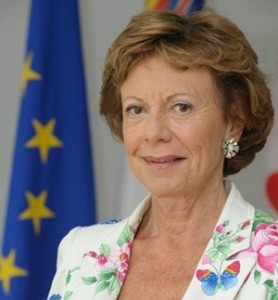Kroes bemoans EU copyright laws
June 8, 2011
By Colin Mann
 Neelie Kroes, EU commissioner for the Digital Agenda, says that Europe’s copyright rules need a major overhaul as the 27-nation European Union’s market for online film and music lags behind others.
Neelie Kroes, EU commissioner for the Digital Agenda, says that Europe’s copyright rules need a major overhaul as the 27-nation European Union’s market for online film and music lags behind others.
She told the CISAC World Copyright Summit in Brussels that in terms of creativity, artists should benefit from the success of their creations. “We therefore need a copyright system which boosts our creative industries instead of holding them back. We need a copyright system fit for the digital era,” she said, sharing her ‘dream’ of artists really living from their art. “I dream of artists embracing the opportunities of the digital era; I dream of artists spreading their art around Europe, and the world, if they so wish; and I dream of European citizens benefiting from all this.
She said she wanted a European copyright system that enabled this dream to be realised and was “utterly neutral” as to how we get there. “Our objective in improving our copyright approach should be to create the legal framework which allows businesses to develop attractive new offers on different platforms and across borders. There will be other implications. These are novel ways for artists to reach their audiences and be paid for it: so, to allow this, the different players in the chain may need to change their role. And functions may need to adapt. But indeed we see that technological developments and changing consumer habits are already exercising an increasing pressure on traditional content production and distribution structures,” she noted.
Kroes said the development of digital infrastructure and the evolving expectations of citizens made an adaptation of the copyright framework “essential”, suggesting that in Europe, the online audiovisual sector was handicapped by fragmentation, primarily along state boundaries and language borders, but also depending on technological advancement and wealth. “This is bad for three reasons. It harms consumer interests and reduces choice. It prevents our audiovisual industry from realising economies of scale and emerging as winners in a strongly competitive global Internet environment. And it does not help in the fight against piracy either. This is why I hope that our Green Paper on the distribution of audiovisual works, due out very soon, will help identify where improvement is needed to achieve a real digital Single Market in this sector.
Comparing Europe and other markets, she noted that in the US, Netflix is the largest single source of Internet traffic in North America. “But we have no pan-European equivalent. Likewise, Spotify – founded in Europe, and a European creative success story – is still unable to run a pan-European service. In short, while US companies compete to provide attractive online content experience to millions of consumers, Europe can boast several regional players at best. This has to change,” she asserted.
She issued a call to make Europe the best place to create, “and let us bring our crown jewel – the single market – to copyright. It is time for us to live up to our European potential.”
